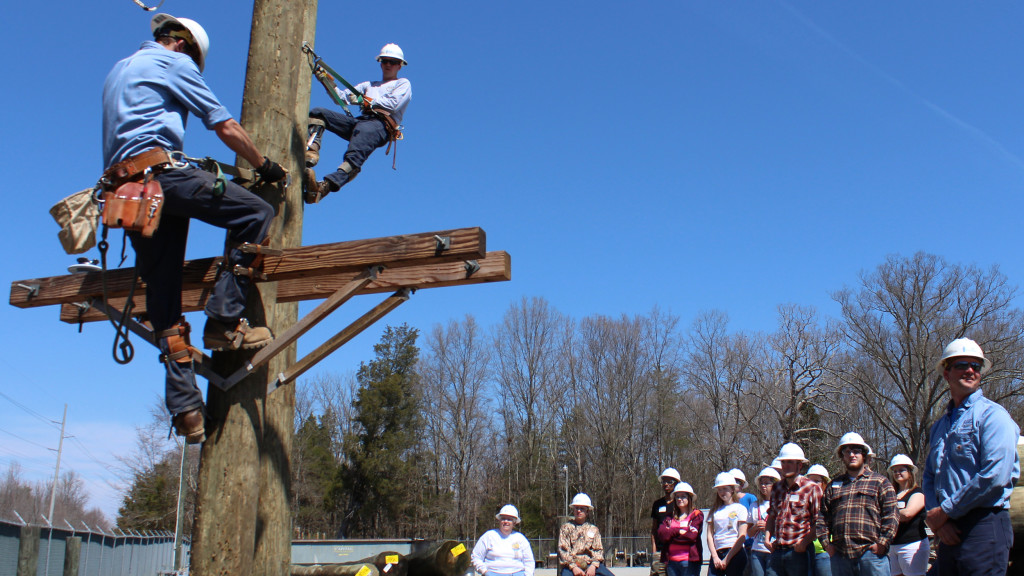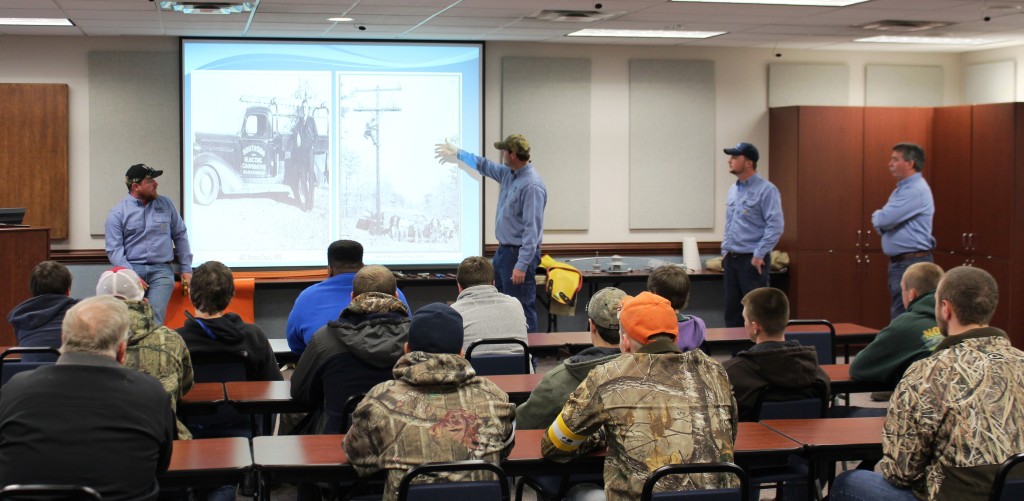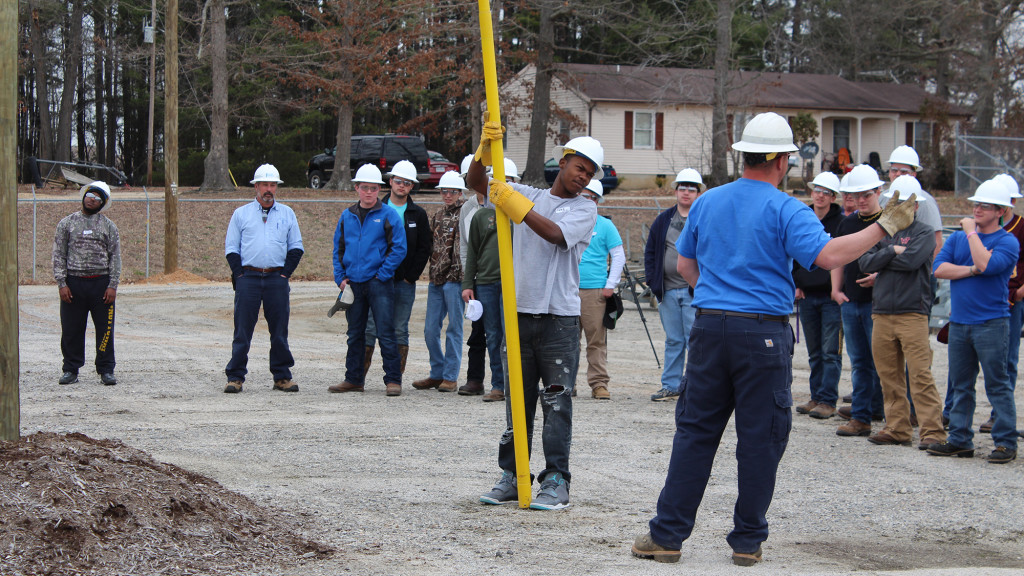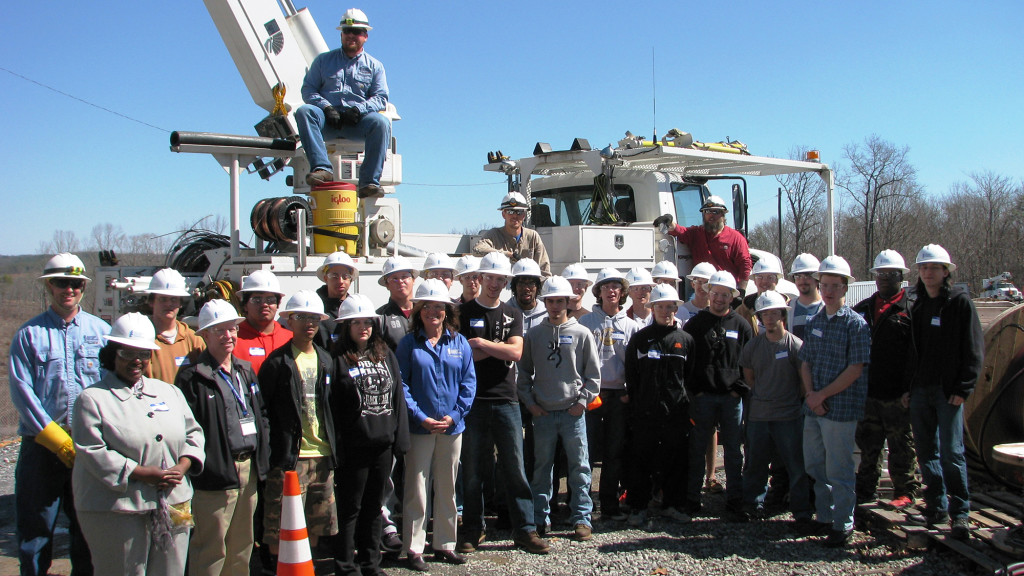
The room was pitch dark, the blinds were closed and cardboard was tacked across the window to eliminate any hint of light. Only the flicker of a small candle provided illumination.
Suddenly, four electric utility linemen raced in, lights beaming from their helmets as they quickly worked to restore power.
When the lights came back on, Carol Hutchinson of Southside Electric Cooperative looked at the spellbound high school students who were part of the simulated blackout and asked, “How many of you think you would want to learn how to do this job?”
Across its sprawling service territory in rural Virginia, SEC is taking a novel approach to recruiting the linemen of the future. It’s more than a career day at a local high school, with co-op employees sitting at a table handing out literature.
Instead, the Crewe-based co-op is bringing groups of students to its training center and district offices to immerse them in the roles, responsibilities and, above all, the culture of electric utility linemen.
The co-op has hosted its “Day in the Life of a Lineman” program for the last four years at six locations. It’s provided hundreds of students with a hands-on look at the industry and the chance to hear from SEC linemen about the challenges and joys of their chosen vocational path.
“If we can make a difference in one student’s life, then we have done something,” said Hutchinson, training coordinator for SEC.
“I hear from talking with a lot of students that they’re just really unsure of what to do and I think this is a great way for them to explore an opportunity.”
The program, the brainchild of SEC President and CEO Jeff Edwards, expands on a pilot the co-op originated in 2013, using the Palmyra, Virginia, training facility of the Virginia, Maryland & Delaware Association of Electric Cooperatives.
Hutchinson said Edwards thought that bringing students to co-op offices would represent an even better chance for them to rub elbows with linemen.
“He wanted to bring it out to our community and the reaction has been great,” said Hutchinson, who added Brad Ashwell and Troy Burgess, a pair of experienced linemen, to round out her presentation team.
Rural Jobs

You want to perk up a group of sleepy-eyed high schoolers?
Tell them that they can make $96,000 a year before their 25th birthday, without necessarily earning a four-year college degree. That’s a realistic expectation, Edwards said.
“I saw a few of their eyes light up. That got their attention,” said Benjy Morris, an agriculture teacher at Amelia High School, who accompanied students to the Powhatan event.
It’s not that SEC places a low priority on college. Edwards said the co-op wants students to know that they have other options, such as going through the apprentice lineman program and working up to a salary that’s lofty by rural standards.
“At last year’s pilot program and the events we’ve done so far this spring, you could detect a level of enthusiasm and see a level of interest,” he said.
“I’m not saying, ‘Don’t go to college.’ That’s not what we’re here for. But the whole point of this process is to make them aware that if you don’t go, there are some good careers,” Edwards said.
Take the case of SEC lineman Mike Southall. He said he didn’t have any particular aim when he graduated from high school and grew frustrated skimming the want ads for electric utility jobs that required five years of experience.
“That’s where a lineman school would help you a little bit, to see if it’s right for you,” Southall, 41, told students at a session in Powhatan. “I’ve been here for 12 years now and I wish I had done it coming out of high school.”
There’s a dual purpose for the co-op, too. Line crews across the country are aging, and it’s essential to groom their replacements. Labor stats indicate the demand for linemen is expected to grow by 9 percent through 2022.
At the same time, adding to the ranks of linemen offers the promise of jobs in rural America.
“There’s a need in the field,” Edwards said. “And this career choice hasn’t been emphasized to an entire generation of young people. We’re filling that need and it’s evident by the way most students respond to the program that we’re showing them something they’ve never considered before.
“Of course, this job isn’t for everyone, but it’s clear that they all enjoy learning about the co-op and the unique aspects of the lineman’s profession,” he said. “If they do decide to pursue this career, these are solid jobs with competitive pay and benefits, and especially in the rural areas, these kinds of options need to be available.”
What It Takes

Brad Ashwell does not sugarcoat anything when he lectures about his duties as a line technician supervisor in SEC’s Altavista office.
Electricity, he told an attentive class in Powhatan, has no conscience.
“You don’t want to make a mistake in this line of work because sometimes that one mistake is your only mistake,” he said.
Further, linemen afraid of heights need to get over it or consider a more earth-bound profession.
“I was afraid of heights when I started this type of work, believe it or not,” Ashwell said. “I didn’t like going up in the bucket truck. The higher the bucket went, the more my knees were doing a dance.”
Those drawbacks aside, the world of a lineman appeared to fascinate students as they witnessed it firsthand.
Ashwell and other linemen went up and down in a bucket truck, demonstrated their climbing abilities on a sample power pole and walked participants through safety demonstrations to see if they could manipulate a tiny nut with a thick glove.
If would-be linemen can master tasks like those while thinking two or three steps ahead and braving the elements with a positive attitude, they’ll be rewarded with initiation into a special band of brothers and some sisters.
“The guys I work with are really close,” Ashwell said. “I can call any of them any time and they’d do anything for me. That’s the bond we’ve got throughout our company. During these lineman rodeos we do, I’ve got guys coming from Kentucky just to watch me compete. That’s the kind of relationship you build in this type of work.”
A Few Takers

Margaret Jones understands the value of lineman training from two perspectives.
As an agriculture teacher at Amelia High School, she attended “Day in the Life of a Lineman” in Powhatan with her students and her Amelia colleague Morris.
Her husband Jerry retired as a lineman from SEC and now is part of the safety and training staff at the statewide association.
“This is a good program,” she said, as she watched several students look at the co-op’s supply yard. “It’s really good for the kids to see different occupations. So many start at a four-year school and don’t finish. They get there and realize, ‘This isn’t what I want to do. I’m coming home.’ ”
The program made a real impression on Jake Morris, 18, who graduated from Amelia County High School in June 2016.
“I considered going to Virginia Teach for agriculture because I grew up on a farm and always worked on a farm, and thought about firefighting,” Morris said. “But I went to ‘Day in the Life of a Lineman’ and that changed my mind.”
After going through the presentation, Jake Morris submitted an application to the new Power Line Worker Training School operated by Southside Virginia Community College, and was part of its second graduating class in September.
That’s a better outcome, Southall concluded, than an employee who preceded him at SEC, never experienced a career seminar and lasted one day on the job.
“His first day on the job, they put him in with a line crew,” Southall recalled. “They rode out to the job and they were going to cut some right of way. On the way in, he put in his two weeks’ notice. He told me, ‘I thought you all just rode up and down. … I didn’t know you did anything.’ ”
Steven Johnson is a staff writer at NRECA.